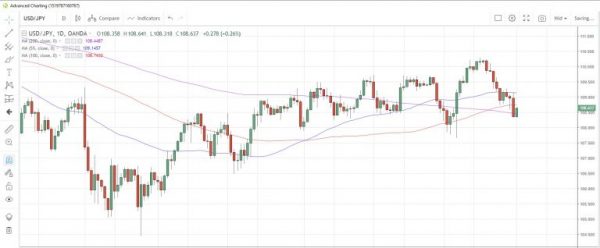China shares slide to more than 8-month low
China markets played catch-up as they reopened after a week-long break. The China50 index fell to the lowest since May 27 last year, extending the latest decline to a third day. Chinese authorities had announced a slew of measures over the weekend aimed at supporting markets. 1.2 trillion yuan ($171 billion) of liquidity was targeted for local markets, with about $21 billion pure cash. The 7-day and 14-day reverse repo rates at this morning’s market operations were trimmed by 10 bps to 2.40% and 2.55%, respectively.
In addition, banks were told to lend more and not call in loans to companies in Hubei province and other affected regions, while night trading sessions for futures were suspended. Some share pledge contracts were allowed to be extended while asset-management rules were also relaxed.
Other shares have technical rebound
US indices recovered slightly from Friday’s sell-off, rising between 0.46% and 0.55%, with the NAS100 index out-performing, while Japan and Hong Kong indices both rallied 0.97% and 1.63%, respectively.
The risk-on mood was evident elsewhere as USD/JPY also recovered, rising for the first time in four days and regaining the 200-day moving average at 108.45. GBP/USD fell for the first time in three days after it was reported Boris Johnson plans to stamp his authority on EU negotiations, saying he is willing to walk away from talks about the relationship between the UK and the EU if he doesn’t get his own way.
USD/JPY Daily Chart
Virus-hit PMIs
Not only are virus fears hitting risk appetite, but it’s now starting to have an impact on the Purchasing Managers’ Indices across the globe. Last Friday, the US Chicago PMI for January missed estimates by a mile, coming in at 42.9 versus 48.8 expected, the weakest reading in five years.
This morning, South Korea’s Nikkei Markit PMI slid to 49.8 from 50.1 while Japan’s Jibun Bank reading slumped to 48.8. China’s Caixin manufacturing PMI also slid to 51.1 from 51.5. There were also weaker readings from Thailand, Vietnam, Malaysia and Indonesia.
The exception to the lower reading was CBA’s January reading for January, which perked up to 49.6 from 49.1, but has been stuck in contraction territory for the past six months. The Philippines also posted a higher reading than the previous month.
Coronavirus update
As at publication, the total number of cases reported has hit 17,392 with the number of deaths escalating to 362, with the first one reported outside of the Chinese mainland in the Philippines. The next most-infected country is Japan with 20 cases. The number of individuals who have actually recovered from the virus has risen to 487. (Source: John Hopkins University)
Hong Kong has announced that local schools would be closed until at least March 2, while civil servants were requested to work from home. Some parts of China remain closed for another week.
The PMI fest continues
The beginning of the month brings with it the usual array of PMI data across the globe. We get the final readings from Markit for Germany, the Euro-zone, the UK and the US, while the ISM reports its own PMI numbers for the US.
The coronavirus situation could imply that the initial readings will be revised lower. Early estimates showed readings of 45.2, 47.8, 49.8 and 51.7, respectively.
The ISM data is expected to show an improvement to 48.5 from 47.2, according to the latest survey of economists, but it’s worth noting the huge miss for the Chicago PMI on Friday mentioned above.

